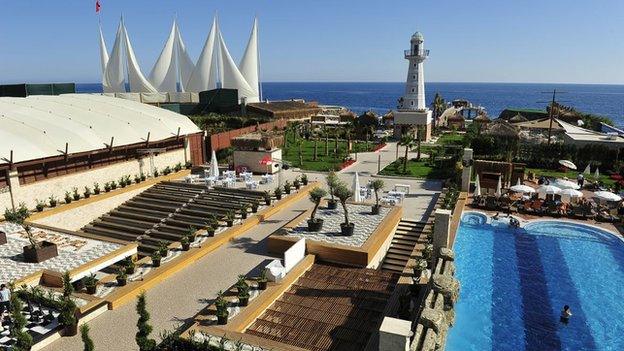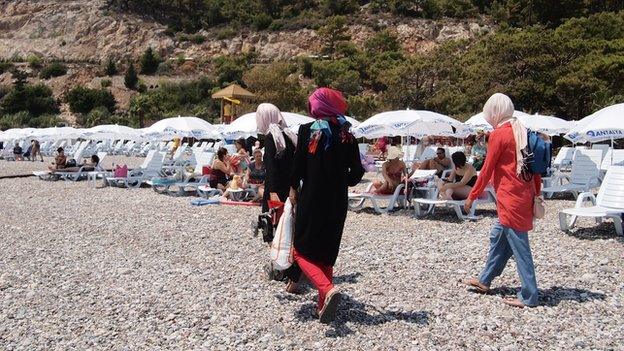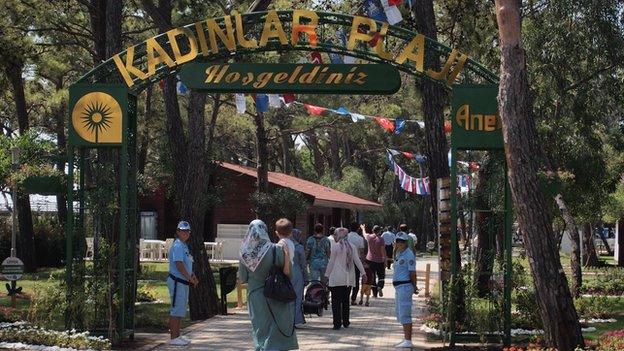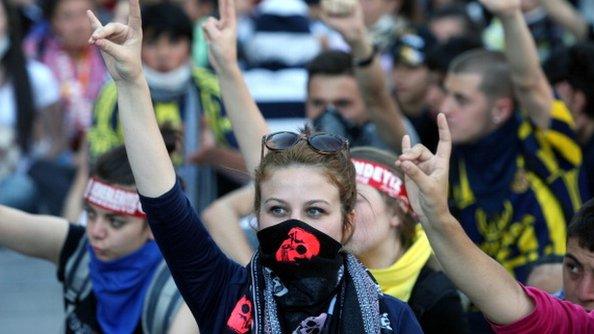Turkey sees rise in halal tourism
- Published

Adenya hotel in Antalya has five segregated swimming pools for women
"Muslims also like to enjoy the beach, make sandcastles and do all the things everyone wants to do," says İqbal.
Along with their four children, Iqbal and his wife Aishah from North London have spent a week in Adenya hotel, in the southern Turkish resort of Antalya.
"We wanted to go somewhere Islamic, that had an Islamic culture," he says. "We've been to Morocco, Dubai, Egypt and other places. I think this place is probably the best in the Islamic world - which allowed for particularly Muslim women to be able to enjoy the beach and swimming."
Aishah agrees: "You don't have to worry about people taking photographs of you and ending up on Facebook or wherever. So you can be completely relaxed."
Antalya would not strike you as an Islamic destination at all, with its thousands of pubs and clubs and hundreds of miles of beaches crowded with men and women in their bathing suits.
But the concept of "Islamic tourism" is on the rise, not only here but in many other cities across Turkey. And an increasing number of hotels are offering what are called "halal holidays" - beach holidays in accordance with Islamic values.
Adenya is one of these "halal hotels" and it has a certificate given by the Malaysian-based World Halal Union.
On its entrance, a blue plaque with seven crescents sits beside the hotel's five stars.
The moment you walk in, you are taken aback by the luxurious marble floors, ornamental pools and fountains.
Further in, a notice reads, "Women's section". You need to pass through security to enter.
There are five swimming pools - all segregated and only for women.
No cameras or phones are allowed. Inside, you can see why. Muslim women have let their hair down, belly dancing to the rhythm of the music.
Almost all of them are in bathing suits. Bikinis rather than burkinis are preferred because the women do not feel obliged to cover up. They feel certain that no male eye can rest on them here.
There is a beach as well, though totally screened off so that no man can see in.
Similarly, no woman is allowed in the men's section. Being a woman, I am told by the hotel management that way is off limits.

Not all the hotel is segregated though: you can have a meal in the restaurant around a table as a whole family.
All the food served here needs to be halal and there is a strict no-alcohol policy.
Aisha says, "We don't have to worry about what we eat. It's been a positive experience for all the family."
Multi-billion dollar market
The number of halal hotels has risen fast in recent years.
When Turkey's Islamist government first came to power there were just five, a local journalist tells me.
The tourism ministry does not have exact figures but Omer Solmaz, general manager of a tourism agency working exclusively for halal hotels, believes there are now as many as 50, attracting approximately five million tourists annually, most of whom are local.
Adenya hotel's owner Ilknur Tataroglu agrees that halal hotels do attract local visitors but says tourists are also coming from Arab countries, Europe, Asia and the Caribbean.

The opening of a women only beach in Antalya prompted debate about the growth of halal tourism
With a global Muslim population of some 1.6 billion, the Halal hotel market is relatively untapped. Turkey, Malaysia, Indonesia and Morocco are amongst the biggest players.
That market is now worth $140bn (£84bn; 106bn euros), according to Crescent Rating agency, which believes it will rise to $192 billion by 2020.
But Turkey's main opposition party argues that the increasing trend of segregated beaches and halal hotels is not just a business matter but also part of an attempt to make the country more Islamic.
Debate about the growth of halal tourism resurfaced when the mayor of Antalya opened a women only beach in the town.
At the opening ceremony, Mayor Menderes Turel told the BBC that further segregated beaches would follow if there was sufficient demand. "If we are defending democratic values and freedom, we should treat everyone equally," he said.
An MP for the ruling Islamist AK party, Gokcen Ozdogan Enc, said the beach would help liberate conservative women, adding that there would never be an attempt to close down mixed beaches.
But opposition MP Aylin Nazliaka told the BBC that segregation meant "women were torn away from social spaces" and confined to "little prisons".
- Published10 August 2014

- Published6 June 2013

- Published22 August 2023
